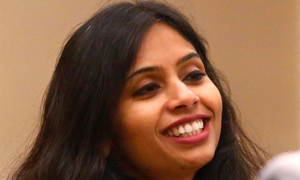 New Delhi, Jan 12: India said Saturday there was “no standoff” with Washington after it expelled a US diplomat in a bitter row over the arrest and strip search of an Indian consulate official in New York.
New Delhi, Jan 12: India said Saturday there was “no standoff” with Washington after it expelled a US diplomat in a bitter row over the arrest and strip search of an Indian consulate official in New York.
Indian foreign minister Salman Khurshid’s comments came a day after New Delhi gave a US diplomat 48 hours to quit the country over the dispute that has seriously strained bilateral ties.
“There is no standoff between India and the US,” Khurshid told reporters, adding “if there are any issues” the countries will “sort them out mutually”. Relations began fraying when Devyani Khobragade was arrested last month on charges of visa fraud involving her domestic servant and lying about how much she paid her.
Shortly before her indictment Thursday, Washington granted the Indian officer - who has denied all charges - full diplomatic immunity, allowing her to return to India in what appeared to be a compromise worked out with New Delhi. But the announcement late Friday that India had ordered the US diplomat to leave in apparent reprisal for its envoy’s treatment in New York suggested New Delhi was not ready to be entirely forgiving.
The deeply unpopular Congress government, struggling to win back favour in general elections due by May, has been under heavy pressure to act tough with Washington as opposition politicians have pounced on US actions.
They have denounced the treatment of the Indian diplomat as a violation of national sovereignty and said the United States should not be allowed to ride roughshod over Indian interests.
News of the US embassy official’s expulsion was splashed over newspaper front pages Saturday along with photos of Khobragade arriving home in Delhi late Friday, her palms pressed together in a traditional Indian greeting. The Indian Express newspaper said: “Delhi goes for revenge expulsion.”
The exact timing of the US diplomat’s departure from India was unclear as the US embassy was not returning phone calls. “I am really thankful for all your support. My government will speak for me, my lawyer will speak for me,” Khobragade, 39, who left her husband and two children behind in the United States, told reporters Saturday.
Khurshid, in other comments on Saturday, called it “unfortunate” that the diplomat “couldn’t complete her (US) tenure”.
The United States said late Friday it “deeply regrets” India’s expulsion of the US official and wanted to mend a partnership Washington has seen as a potential bulwark against China’s growing might.
“We’re looking to move our relationship forward. We’re looking to move past this challenging time,” US State Department spokeswoman Jen Psaki said.
US President Barack Obama had earlier called relations with India “one of the defining partnerships of the 21st century”.
Khobragade allegedly obtained a visa for her maid by promising to pay her $4,500 a month and then struck a secret deal to pay her 30,000 rupees ($573) a month, far below the US minimum wage.
Despite its soothing words, Washington has said the Indian diplomat cannot return to the United States unless she surrenders to the court.
The US embassy would not identify the expelled official but Indian newspapers named him as Wayne May, who managed security staff. The expelled US diplomat was of “similar rank” to Khobragade, the media said.
The diplomat’s arrest outside her children’s school and treatment in custody, where she was cavity searched, outraged India, which insisted she had diplomatic immunity.
India used bulldozers to remove security barriers at the US embassy in New Delhi and even stopped the mission importing duty-free alcohol.
While Americans took the maid’s side, many affluent Indians who pay their servants far less than Khobragade was accused of paying hers, supported the diplomat and viewed her treatment as high-handed superpower behaviour.
Even traditional US supporters were angered by Washington’s actions. “The US is so good at arm-twisting - India is just playing their game,” the national president of the Indo-American Chamber of Commerce, Chella Srinivasan, told AFP in a recent interview.





Comments
Add new comment